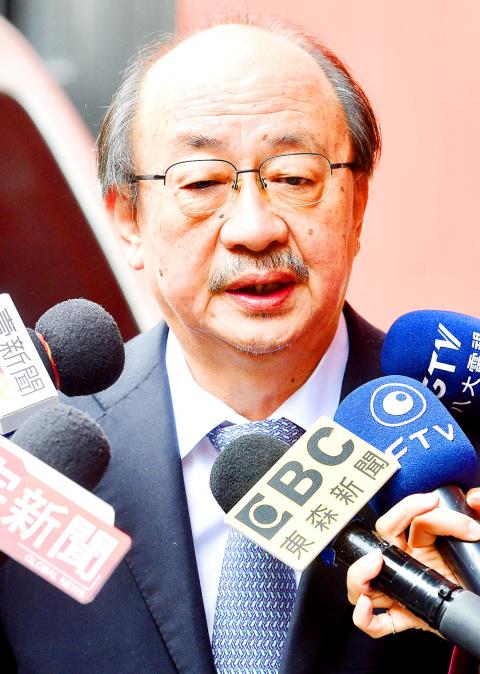The Executive Yuan does not have a fixed timetable for the passage of the draft amendment to the Labor Standards Act (勞動基準法), Premier William Lai (賴清德) said yesterday, after a legislative committee review of the proposal was stalled by Chinese Nationalist Party (KMT) lawmakers.
Speaking on the sidelines of a long-term care event in Taipei, Lai called for a rational review of the draft amendment to bring it more in line with the needs of society.
“At the Executive Yuan, we can decide our own timetable [for draft bills.] However, once they are sent to the Legislative Yuan, we must respect the legislative proceedings. We do not have a fixed timetable” for the bill’s passage, he said.

Photo: Peter Lo, Taipei Times
Despite Democratic Progressive Party (DPP) lawmakers’ failed attempt to complete committee review of the bill on Thursday due to stalling tactics by their KMT counterparts, Lai said the fact the draft amendment was able to survive a plenary vote last week and be forwarded to the committee for review was progress.
That being said, given the limitations of the current “one fixed day off and one flexible rest day” policy in terms of personnel arrangement and working hours, “it goes without saying that the Executive Yuan hopes to see the problem solved as soon as possible,” Lai said.
Thursday’s session yielded little result due to filibustering by KMT Legislator Chiang Wan-an (蔣萬安) for more than two hours.
Labor groups have also protested against the proposed revisions, which would raise the ceiling on the number of consecutive working days from six to 12 days.
The amendment would also allow companies to cut the minimum rest time between shifts from 11 hours to eight hours if they reached an agreement with employees during labor-management negotiations.
The legislation was drafted after the “one fixed day off and one flexible rest day” policy passed by the DPP administration in December last year met with strong criticism from businesses. The policy ensures workers at least one day off after every six days worked and overtime pay for employees working on their flexible rest day.
DPP caucus whip Ker Chien-ming (柯建銘) lamented the caucus’ failure to have the committee pass the draft amendment on Thursday, saying it should serve as a “warning” to the caucus and pointing to “flaws” in the caucus’ operations.
For one, some DPP lawmakers that attended the committee meeting forgot to sign in, which led to the DPP’s defeat in a vote, Ker said.
“We will engage in introspection and make improvements,” he said.
The caucus hopes to pass the proposed amendment as soon as possible, but if it fails to pass the third reading by the end of this year, “surely it can be passed during an extempore session,” he added.
Meanwhile, KMT Chairman Wu Den-yih (吳敦義) said he fully supports Chiang’s and the KMT caucus’ goal.
“The draft amendment should be able to create a win-win situation for both employers and employees. There are some steps that have been overlooked in the legislative proceedings, such as holding more public hearings nationwide to bridge the differences between workers and management,” Wu said.
Additional reporting by Sean Lin

An essay competition jointly organized by a local writing society and a publisher affiliated with the Chinese Communist Party (CCP) might have contravened the Act Governing Relations Between the People of the Taiwan Area and the Mainland Area (臺灣地區與大陸地區人民關係條例), the Mainland Affairs Council (MAC) said on Thursday. “In this case, the partner organization is clearly an agency under the CCP’s Fujian Provincial Committee,” MAC Deputy Minister and spokesperson Liang Wen-chieh (梁文傑) said at a news briefing in Taipei. “It also involves bringing Taiwanese students to China with all-expenses-paid arrangements to attend award ceremonies and camps,” Liang said. Those two “characteristics” are typically sufficient

A magnitude 5.9 earthquake that struck about 33km off the coast of Hualien City was the "main shock" in a series of quakes in the area, with aftershocks expected over the next three days, the Central Weather Administration (CWA) said yesterday. Prior to the magnitude 5.9 quake shaking most of Taiwan at 6:53pm yesterday, six other earthquakes stronger than a magnitude of 4, starting with a magnitude 5.5 quake at 6:09pm, occurred in the area. CWA Seismological Center Director Wu Chien-fu (吳健富) confirmed that the quakes were all part of the same series and that the magnitude 5.5 temblor was

The brilliant blue waters, thick foliage and bucolic atmosphere on this seemingly idyllic archipelago deep in the Pacific Ocean belie the key role it now plays in a titanic geopolitical struggle. Palau is again on the front line as China, and the US and its allies prepare their forces in an intensifying contest for control over the Asia-Pacific region. The democratic nation of just 17,000 people hosts US-controlled airstrips and soon-to-be-completed radar installations that the US military describes as “critical” to monitoring vast swathes of water and airspace. It is also a key piece of the second island chain, a string of

The Central Weather Administration has issued a heat alert for southeastern Taiwan, warning of temperatures as high as 36°C today, while alerting some coastal areas of strong winds later in the day. Kaohsiung’s Neimen District (內門) and Pingtung County’s Neipu Township (內埔) are under an orange heat alert, which warns of temperatures as high as 36°C for three consecutive days, the CWA said, citing southwest winds. The heat would also extend to Tainan’s Nansi (楠西) and Yujing (玉井) districts, as well as Pingtung’s Gaoshu (高樹), Yanpu (鹽埔) and Majia (瑪家) townships, it said, forecasting highs of up to 36°C in those areas